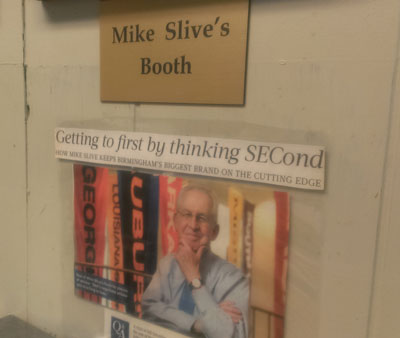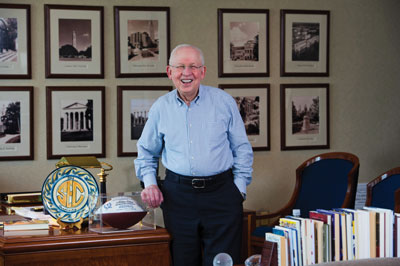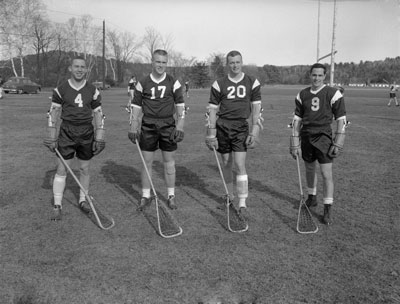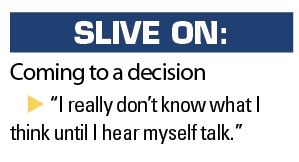It’s before 9 a.m. on a sultry summer morning in Birmingham, Ala., and Mike Slive is kicked back, a lit cigar between his fingers. He’s sitting on the back porch of his home, taking in the 15-mile view across the hilly suburbs as he contemplates the last 13 years as SEC commissioner.
Man, if this porch could talk. This is where Slive was sitting when Texas A&M’s president called to inquire about membership in the SEC. This is where he and TV consultant Chuck Gerber smoked cigars, sipped merlot and ate barbecue while they plotted the future of an SEC Network. The back porch is where Slive celebrated media deals with ESPN’s John Skipper and envisioned a college football playoff with Bill Hancock.
It’s where Slive looked into the distance and saw the future of intercollegiate athletics, and just recently, it’s where he’s reflected on the past as he enters retirement.
“There is no ‘today’ for a commissioner,” Slive said between puffs on the cigar. “When I wake up in the morning, that
 |
Slive leans against a lacrosse stick on his back patio overlooking the Birmingham suburbs.
Photo by: R.D. Moore |
day has already been planned, thought out, staffed, and it’s only about implementation. I don’t need to be involved in that. I need to be thinking about tomorrow, five years from now, 10 years from now, 20 years from now. The horizon is much longer for a commissioner. That’s one of the reasons I like sitting on the porch with my cigar, thinking about the issues of tomorrow.”
{podcast}
SBJ Podcast:
Writer Michael Smith and Executive Editor Abraham Madkour discuss Mike Slive's impact on college athletics, his management style and what the former SEC commissioner's future holds.
These are good days for Slive, who handed off the SEC commissioner’s title to Greg Sankey last month. He is surrounded by family and his health has improved. Slive’s daughter lives nearby, meaning he and wife Liz are always available to babysit 3-year-old granddaughter Abigail. He also got a good report last month from his prostate cancer doctors, who said they don’t need to see him again until September.
The peace the back porch provides takes on a different meaning now for Slive, 75, as he enters the next phase of his life. He’ll remain an SEC consultant, happy to help the new commissioner see down the road and around the bend of college sports, as Slive did for so many years.
But mostly, Slive’s mind is on taking trips with Liz and converting an upstairs room into a home office with his favorite stand-up desk.
It’s a time in his life that reminds Slive of something his father used to tell him when he was young.
“Life is a 15-round boxing match,” his dad would say. “What matters is the 15th round.”
“He figuratively took us by the hand and led us down a path,” Jay Jacobs, Auburn’s athletic director and chair of the conference ADs, said of Slive. “I’ve been around a lot of great coaches, a lot of great administrators and a lot of great CEOs, and Mike is the best I’ve seen.”
One of the guys
There’s Mike Slive, the visionary commissioner. There’s Mike Slive, the tough negotiator. There’s Mike Slive, the crafty, persistent politician who often is called the most powerful man in college sports.
Then there’s Mike Slive, the guy pouring coffee before dawn at Salem’s Diner in Homewood, a Birmingham suburb.
 |
Mornings start at Salem’s Diner, where owner Wayne Salem (right) has set aside a personal spot for Slive. Wayne’s father played football at Alabama.
Photos by: Michael Smith |
This is where “Commish” is just one of the fellas, giving it just as good as he gets.
Hours before he had retired to the back porch with his cigar that summer morning, Slive and a group of friends met at the usual spot for breakfast.
Slive was feeling like his energetic old self, not the guy who gritted his teeth through several months of chemotherapy and radiation to treat prostate cancer, which forced him out of public view late in 2014 and early 2015.
He walked around the cozy diner with a coffee pot in hand, topping off everyone’s cup. He joked with the collection of six or seven regulars who greet him with “Commish” or simply “Mike.”
Slive is a notorious early riser. It wasn’t unusual for him to meet SEC senior staffers at 6 a.m. at a nearby Starbucks.
(Starbucks is for business; Salem’s is for pleasure.)
On this morning, he was out of bed at 4:20 a.m., 30 minutes before his alarm was set to go off. As he walked into Salem’s around 6 wearing a broad grin, Slive pointed up at the TV on the wall, which was showing ABC’s “Good Morning America.”
“Hey, is that the SEC Network?” Slive said with a smile, knowing it wasn’t. The channel was changed quickly.
“Where’s Mitch, we’re missing Mitch?” Slive said about one of the regulars who was absent this day. Undeterred by the early morning hour, Slive called Mitch’s cell phone and left a voicemail.
“Hey, Mitch, we took a vote and it was 3-2 that we wish you were here,” Slive said while everyone listened in and laughed.
He loves how he’s treated like any other regular at Salem’s. Well, almost. There is a plaque next to one table that reads, “Mike Slive’s Booth,” with his picture and a newspaper clipping underneath it. A few of the regulars repositioned to another seat when he came in, despite his protests.
“Oh, he’s a legend at Salem’s,” Sankey said. “He’s a big deal.”
This is his kind of hangout. There’s Wayne, the owner whose dad played football at Alabama; Casey, the Samford baseball coach; Richard, the doctor; John, the ex-Marine; Billy, the construction guy from UAB; Mitch, who works at the hospital; David, the attorney; Allen, who runs a magazine for farmers; and Dickey, the former high school football coach.
Slive, the most influential man in college athletics, somehow fits right in.
The Utica, N.Y., native even has grits with his egg whites, toast and slice of tomato.
“I love grits,” the native New Yorker said with a grin.
Here, they don’t ask him about his leadership style or what made him such an effective commissioner, the kind of questions that make him bristle.
No one in Salem’s, thankfully, ever refers to Slive as a consensus-builder.
Ask him about the College Football Playoff, ask him about the NCAA, ask him about the SEC Network — all important items in his legacy — but please don’t ask him about himself.
“I don’t have a style. I don’t think about a style,” Slive said. “You sit, you listen, you think, you deliberate, you say things in the meeting that are constructive and helpful. I don’t have a plan. I don’t have a style. Other people say that. It’s about getting at the issue.”
Full of surprises
The charming and witty Slive at Salem’s doesn’t come off as the same Slive who ruled the SEC, negotiated billion-dollar media contracts, helped reshape the NCAA and imagined the format for a four-team playoff a full decade before it came to pass.
That Slive played it close to the vest publicly, careful not to say too much.
“He’s the most meticulous, thoughtful, calculated and careful person I’ve ever seen,” said Charles Bloom, a South
 |
While he’s now retired, Slive’s moves set the course for college sports for years to come.
Photo by: R.D. Moore |
Carolina administrator who formerly ran public relations for Slive and the SEC. “Not once did I ever have to call a reporter to clarify Commissioner’s comments.”
“A recovering lawyer,” he’d call himself, Slive was too well-prepared to ever put his foot in his mouth and he didn’t negotiate in public.
“I can’t ever remember him misspeaking in a public setting. I don’t think he ever did, not once,” said his daughter, Anna Slive Harwood, an executive with the Colonnade Group in Birmingham. “He was always so careful and so aware of who he was speaking to.”
But just like the New Yorker who loves the grits at Salem’s, what you quickly learn about Slive is that he’s full of surprises.
While keeping a profile that was guarded and conservative, Slive befriended Paul Finebaum, the often-controversial radio host who thrived on stirring up SEC fans. Finebaum later was hired by the SEC Network.
From the outside, they couldn’t have seemed more different. What they discovered, through a series of lunch meetings, was that they were remarkably similar, from their religion — “Two Jews in Birmingham,” Finebaum said — to their love of books, especially Daniel Silva spy novels.
At each monthly lunch meeting, usually at Brio Tuscan Grille in Birmingham, they’d give each other the gift of a book.
Often, they’d run into each other at the Books-A-Million next door to Brio before lunch.
“It’s a pretty unlikely relationship,” Finebaum said. “Here we are, two people from different sides of the aisle, one from media, one from the conference. It was somewhat bewildering, but very satisfying. … Very seldom did we talk about business. We didn’t sit around talking about Nick Saban’s next championship. That just wasn’t part of the conversation.”
When Skipper decided to hire Finebaum for the ESPN-owned SEC Network, he sought Slive’s blessing. They stood on the sideline of the BCS championship game between Alabama and Notre Dame when Skipper gently broke the news about offering Finebaum a job, and then braced for pushback from Slive because of Finebaum’s reputation for stirring the pot.
Slive laughed and told Skipper that Finebaum is one of his closest friends.
Slive also fought for greater transparency on both SEC and NCAA fronts. He proposed keeping SEC football locker rooms open to the media, Bloom said, but the coaches shot that down.
When he chaired the NCAA basketball committee a decade ago, Slive argued in favor of a mock selection for the media members, so they could better understand and report on the process.
“The committee had turned down the idea of a mock draft, but Mike led a very thoughtful conversation and got it done,” said former NCAA executive Greg Shaheen. “He said that we should be forthcoming; we have nothing to hide.”
While his many friends like to call Slive a visionary, he was just as much an innovator.
When it comes to most of the biggest events during his tenure, the SEC wasn’t usually the first to break new ground. The conference just did it better than most.
The SEC wasn’t the first to expand in the most recent realignment, but the addition of Texas A&M and Missouri might have been the most impactful expansion by any conference.
The SEC wasn’t the first to start a conference-branded channel, but the SEC Network enjoyed the most successful launch in cable history, debuting in 65 million homes.
“You have to remember that Mike is an attorney,” Gerber said. “He needs evidence. He needs proof. He’s very methodical, and he doesn’t say a word before he thinks about it. That’s how he goes about making every decision.”
First taste of sports
In the 1950s, Utica was a solid, blue-collar town. People built bonfires on football Friday nights and after the game they’d meet at the King Cole ice cream shop for 25-cent milkshakes.
Slive’s introduction to sports came early. The son of a meat-market owner, Slive grew up competing, a trait that many of his associates say never left him. The high school years for Slive were defined by the sports seasons — football in the fall, basketball in the winter, and baseball and track in the spring.
When tall, lanky Bill Cowl moved to Utica in the sixth grade, Slive saw Cowl’s height and immediately thought of the
 |
Slive (left) picked up his first lacrosse stick at Dartmouth, yet lettered three years.
Photo by: Slive Family |
school basketball team. Slive greeted him in the hallways at school and the first thing he said was, “Do you play basketball?” The school team was a little shy on height and Slive convinced him to play.
“Mike was a tough competitor,” Cowl said. “He was a good football player, but I always thought his first love was basketball.”
The meat shop run by Slive’s father became a popular hangout in the summer among his friends and high school football teammates. Cowl designed signs in the window. Others pitched in to help cut the meat, including Slive who spent summers helping his father. Slive made extra money by filling in for meat cutters in other shops who were away on summer vacation.
Cowl said Slive, the senior class president, was a consummate leader at quarterback as the signal caller in the T-formation offense at Utica Free Academy. Undersized and not especially blessed with a strong arm, Slive would be called a game manager these days.
Through the ensuing years, which included stops at the Pac-10, Great Midwest, Conference USA and SEC, in addition to his law career, Slive never lost touch with a core group of six former high school teammates. “The Utica Boys,” as Slive calls them, were his guests at the SEC championship game a few years ago and they attended an SEC celebration of Slive’s retirement in Atlanta last month.
In an interview with SportsBusiness Journal that lasted all morning, Slive shared insights about business, family and battling cancer, but only once was he moved to tears and that’s when he talked about “The Utica Boys.”
Playing football with guys like Cowl, Bob Spatuzzi and others “was the most wonderful time,” Slive said through the tears, thinking back 60 years ago.
“Things like that mean the most to him,” Liz said, holding the hand of her husband of 47 years. “He’s got the biggest, warmest heart.”
Despite his limitations as a high school quarterback, Slive managed to catch the eye of a Dartmouth assistant football coach, who offered him a chance to try out for the team. In the days before scholarship and roster limits, schools recruited many more players than they could ever use, so when Slive started fall practice with the Dartmouth football team, “there were 23 quarterbacks and 22 centers and I was the one quarterback without a center,” Slive said. “I knew it was pretty clear my football career was nearing its end.”
Slive then went out for the lacrosse team at Dartmouth. He had never played the sport, yet went on to letter for three years.
“The first game I played in was the first game I ever saw,” he said with a smile.
In the classroom, Slive thrived and he went to Dartmouth to study pre-med with the hope of one day being a doctor. But he met one of the toughest foes he’d ever encounter — chemistry. He changed majors and began studying government, which he didn’t enjoy that much, but it was a suitable ramp toward his law degree and an early career as a defense attorney in New Hampshire. But he never stopped thinking about sports.
“I saw an ad for a job at the Pac-10 in the Chronicle of Higher Ed,” Slive said of the job that launched a nearly 40-year career in athletics. “I never could get sports out of my system. Until I got the job at the Pac-10, I was just restless.”
Game changer
Slive’s legacy at the SEC will forever be tied to four game-changing events in the last 13 years.
■ He set the tone for diversity among the head football coaches. The SEC had never had an African-American head football coach before Slive, and the conference has had five in the last dozen years, starting with Sylvester Croom’s hiring at Mississippi State in 2003.
■ Slive challenged schools to clean up their act and get off NCAA probation. When Slive was hired in 2002, nine of the
12 schools were embroiled in infractions cases. The SEC’s new commissioner infamously pledged to have all of the league’s schools off probation within five years.
■ The SEC and ESPN launched the SEC Network on Slive’s watch, debuting last August in 65 million homes. ESPN called it the most successful cable channel launch ever.
■ And for 10 years he drove the conversation for the College Football Playoff. Slive first sketched out the idea for a plus-one model after Auburn went undefeated in 2004 and was left out of the BCS championship game. Even though the SEC thrived in the BCS era, winning seven straight titles, Slive never stopped beating the drum for a playoff.
What makes Slive proudest is that those shifts in intercollegiate athletics will leave long-lasting impressions. They weren’t just one-offs that made a temporary impact. They changed a conference, and college football.
| Year |
ACC |
Big Ten |
Big 12 |
Pac-12 |
SEC |
| 2013 |
$313.3 |
$338.9 |
$227.7 |
$374.0 |
$325.9 |
| 2012 |
$232.4 |
$318.4 |
$217.1 |
$334.0 |
$314.5 |
| 2011 |
$223.6 |
$304.3 |
$159.5 |
$175.9 |
$273.1 |
| 2010 |
$167.2 |
$265.1 |
$159.7 |
$111.8 |
$261.0 |
| 2009 |
$158.2 |
$232.4 |
$148.9 |
$101.9 |
$244.4 |
| 2008 |
$172.7 |
$222.0 |
$144.0 |
$96.8 |
$148.0 |
| 2007 |
$162.8 |
$217.7 |
$129.9 |
$96.1 |
$161.6 |
| 2006 |
$159.8 |
$177.4 |
$119.3 |
$88.8 |
$149.2 |
| 2005 |
$148.9 |
$126.9 |
$113.4 |
$76.6 |
$138.7 |
| 2004 |
$128.9 |
$125.5 |
$114.1 |
$74.0 |
$135.5 |
| 2003 |
$110.6 |
$124.7 |
$110.4 |
$75.1 |
$130.3 |
| 2002 |
$109.1 |
$117.0 |
$98.2 |
$76.8 |
$122.5 |
Note: Total revenue in millions.
Source: Form 990, Department of the Treasury, Internal Revenue Service
“The legacy is one of the more remarkable ones in sports,” said Sean McManus, chairman of CBS Sports. “The enormous increase in revenue, the addition of two schools [Texas A&M and Missouri], the most successful cable launch in history. Also, what can’t be forgotten is Mike’s commitment to diversity and inclusion. Mike had a commitment not just in words, but in action.”
Slive, in an uncharacteristic moment of conference bravado recently, called these years “The Golden Age of the Southeastern Conference.” And who can argue? His leadership on issues like NCAA governance, which led to autonomy for the power five conferences, and the SEC’s competitive success, vaulted Slive into a position where his voice typically could be heard over the others.
“There is a certain leverage that comes with that much competitive success,” ACC Commissioner John Swofford said.
Despite so many variables, from the changing landscape in college athletics to antirust lawsuits and his own health concerns, Slive still managed to choreograph his exit from the SEC on his terms.
He calls the timing just right — his contract ends on Friday. He had been talking to the conference presidents discreetly for the last few years about retirement anyway. When his prostate cancer returned last year, metastasizing around his spine and requiring surgery 11 months ago, Slive turned much of his focus to his treatment, knowing that the conference operations were in good hands with Sankey.
As Slive relaxed on his back porch and reflected on his treatment, a mischievous grin crept across his face as he thought about the challenge he issued his cancer doctors.
“Look, my granddaughter is 2,” Slive told the doctors last year. “She’s going to have her bat mitzvah in 11 years. I’ve already written my remarks. I know what I’m going to say. If I don’t get there, it’s your ass.”
The Slive File
Personal
■ Born: July 26, 1940
■ Hometown: Utica, N.Y.
■ Family: Wife, Elizabeth; daughter, Anna
Education
■ Undergraduate: Dartmouth College, B.A., 1962
■ Graduate: University of Virginia, JD, 1965
Georgetown University, LLM, 1966
Legal experience:
■ 1969-77: Partner, Stebbins & Bradley, Hanover, N.H.
■ 1972-77: Judge, Hanover (N.H.) District Court
■ 1977-79: Judicial master and clerk, Grafton County (N.H.) Superior Court
■ 1983-86: Founder, Law Offices of Michael L. Slive, Hanover, N.H.
■ 1986-91: Partner, Coffield Ungaretti & Harris, Chicago
Career in athletics:
■ 1968-69: Assistant athletic director, Dartmouth College
■ 1979-81: Assistant executive director, Pac-10 Conference
■ 1981-83: Athletic director, Cornell University
■ 1990-91: Senior partner, founder, Slive/Glazier Sports Group
■ 1991-95: Commissioner, Great Midwest Conference
■ 1995-2002: Commissioner, Conference USA
■ 2002-15: Commissioner, Southeastern Conference
Boards and committees:
■ 1993-2002: NCAA Infractions Appeals Committee (Chair)
■ 1997-2004: NCAA Management Council; NCAA Management Council Subcommittee to Review Automatic Qualification
■ 1997-2001: Sports Lawyers Association (Board of Directors)
■ 1998-99: NCAA Division I Working Group to Study Basketball Issues
■ 1998-2003: NCAA Football USA (Chair, Board of Directors)
■ 1999-2001: Division I-A Commissioners (Chair)
■ 1999-present: Board of Advisors/Marquette Sports Law Institute
■ 2001-03: Collegiate Commissioners Association (President)
■ 2002-08: National Letter of Intent Steering Committee (Chair)
■ 2002-03: Commission on Athletic Opportunity
■ 2004-09: NCAA Division I Men’s Basketball Committee (Chair, 2008-09)
■ 2006-08: Bowl Championship Series coordinator
Source: SportsBusiness Journal research
THEY SAID IT
“The SEC was looked upon, in a condescending way, as a football factory. It was all about pretty girls, parties and tailgating. Mike’s oversight really helped get more of the message back on education and the student athlete.”
— Robert Khayat, former Ole Miss president
“He was so meticulous about details. Before he’d finalize a report, he’d fact check every word. He’d say, ‘Never have a word if you didn’t know what it means.’ It was a great lesson for me and really set the tone for my career.”
— Kevin Warren, COO, Minnesota Vikings, a former attorney who practiced with Slive
“Mike is thoughtful, but he doesn’t always tell you what he’s thinking. He doesn’t have a compulsion to weigh in on every topic and he doesn’t speak just to hear himself. But when he has a contrary position he’ll weigh in. Mike makes good use of his comments.”
— Bob Bowlsby, Big 12 commissioner
“When I was at CBS, Mike insisted I stay at his house when I visited. Mike would get up early, knock on my door, and say, ‘Let’s go have a cigar before breakfast.’”
— Mike Aresco, commissioner, American Athletic Conference
“They won’t have a financial problem for a very long time.”
— TV consultant Chuck Gerber on the SEC Network
“He wasn’t familiar, so people weren’t real sure about him. But he turned out to be the right person at the right time.”
— Mark Womack, executive associate commissioner and CFO, SEC
“The first time I met Mike was after a Georgia game at Auburn. We finish the game, and there’s supposed to be a bus waiting on us. Well, we go to the first elevator, and it’s out. We go to the second elevator, and the line is like 60 people deep. We had no choice but to take the steps from the top of the stadium. So I’m sweating and cussing and saying a lot of things I’m not proud of when we finally get on the bus. Our producer, Craig Silver, is there, and he says, ‘Verne, where you been? Oh, meet Commissioner Slive.’ Well, luckily the commissioner and I were able to get past that shaky start.”
— Verne Lundquist, CBS Sports
“Mike always had a perspective that everybody hadn’t uncovered yet. But at the right time, it was shared, and you’d see the light bulbs go off.”
— Eli Capilouto, president, University of Kentucky
“I’ve never seen him shoot off his mouth. I’ve never seen him say, ‘OK, I’ve had it.’ He’ll never burn the bridge.”
— Nick Zeppos, chancellor, Vanderbilt University
“With Mike, I always felt like I knew who he was.”
— John Swofford, ACC commissioner










